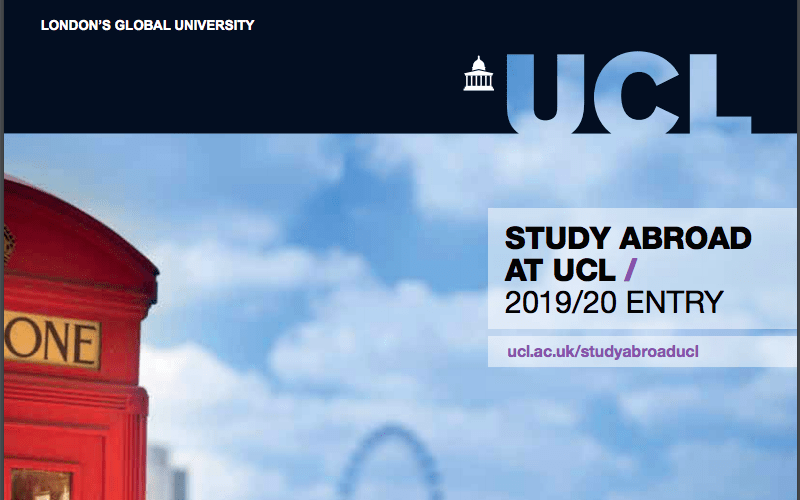New Report on Study Abroad and Student Mobility: Stories of Global Citizenship?
By By Guest Blogger, on 20 September 2019
By Nicole Blum
Development Education Research Centre, UCL Institute of Education
In 2017 we received funding from the Global Engagement Office to identify some of the reasons young people decide to study abroad and what they think they gain from the experience. The research, conducted by myself with support from Douglas Bourn, set out to understand whether the learning students have gained resonates with UCL’s global citizenship and student mobility strategies.
The term ‘global citizenship’ has been around for a while, but is often used in different ways. Key authors in the field suggest that it can have a number of dimensions, including a focus on increasing global employability and competitiveness, cultivating greater understanding and appreciation of difference, or critical engagement and radical transformation of inequitable global structures and relationships.
UCL’s definition includes elements of all of these dimensions, and describes global citizens as individuals who: understand the complexity of our interconnected world, understand our biggest challenges, know their social, ethical and political responsibilities, display leadership and teamwork, and solve problems through innovation and entrepreneurship.
Our work was motivated by the common assumption that international experiences for students – including study abroad, overseas volunteering and work placements, and international travel – will result in positive learning about diverse cultures and global concerns.
While there is plenty of research which strongly supports this idea, it has tended to be based on quantitative data from questionnaires completed at the end of an experience. Relatively little research has looked in-depth at student’s own perceptions about their learning while abroad or when they return home.
We interviewed undergraduate students on UCL’s Arts and Sciences (BASc) programme to gain a better understanding of their perceptions.
The data highlighted a range of push and pull factors which influence young people’s study abroad decisions, as well as a wide range of ways in which the experience encourages (or does not) reflection on global issues and on students’ sense of themselves in the world.
Students highlighted the personal aspects of being a ‘global citizen’ when talking about their study abroad experiences:
Studying abroad was the first time I felt like I could call myself a global citizen. Before this, I had some awareness and interest in international issues, but had never left Europe and only travelled for brief periods of time. On returning, I found I had a reverse culture shock, and could relate better to international students studying in the UK.
The evidence also suggested that a number of different kinds of learning take place during study abroad, including about particular topics/ issues, experiences of particular places and/ or exposure to new ideas:
I really do think my sense of history has changed and sense of international politics has changed, and also a sense of what an English person is had changed.
Learning about colonialism and racism in the Netherlands taught me to reflect more on my own country’s issues and ugly history. Thus, making me think more globally about the lives of individuals who have suffered as a result of colonialism.
While these experiences can be highly significant for individuals, it is important to recognise that transformative learning may not happen without support. Students in this research clearly recognised the value of their study abroad learning and experiences, but also the need for more ways to reflect on this with programme organisers and with peers, particularly if they are to be able to take their learning forward.
UCL clearly sets out the potential outcomes of study abroad, with a strong emphasis on the benefits to participants’ enhanced employability, new experiences and skill development. The students we interviewed tended to agree with these benefits, although they often emphasised one aspect as most relevant to their own experience:
I’m actually probably more open now to going and working in other countries or studying in other countries, and it doesn’t feel impossible, it doesn’t feel like this huge ordeal, like this huge challenge, because ‘Oh I’ve done it now’.
I really thought I was just going to learn French, but actually I got a lot out of it academically. I took quite a lot of … studies in creative art, so video games and the cinema and comic books…. there’s a huge games industry out there but also the arts are quite strong in Montreal. And it sort of convinced me that that was a legitimate career choice. I think before then I’d sort of seen that as … you know creative industries is kind of a pipe dream, or it’s something you do if you get lucky. But actually, out there [in Canada] there are people writing scripts for video games or films or … and the fact that I could study it as an academic discipline made me realise that this is a legit thing … it’s not just this fanciful dream. So actually, I’m now hoping to go into radio.
While this study reveals some of the reasons behind the decision to study abroad, more research is needed to explore more deeply how students themselves understand their experiences of study abroad and the ways in which their learning informs their lives in the future. This is perhaps particularly important in the context of increasingly diverse student groups as well as a rapidly changing world.
For more details about the study, access the full report here: http://discovery.ucl.ac.uk/10078730/
 Close
Close




